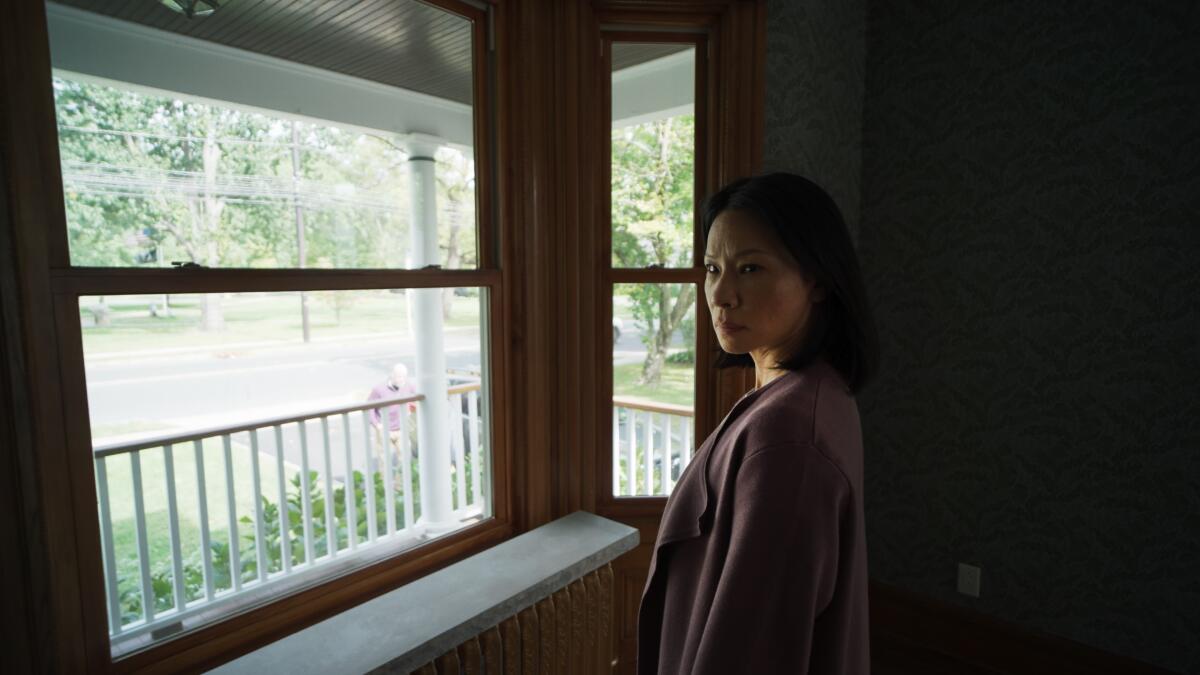Review: ‘Presence’ is a cerebral ghost story that hides a family drama under the sheet

- Share via
Long live Steven Soderbergh, a filmmaker who resists any premature obituaries that the movies are a dying art form. Soderbergh rarely rests. He’s made 14 movies since he first teased retirement in 2010 and, over the course of his career, has helped boost two innovations: first, the indie revolution with 1989’s “sex, lies and videotape,” and then, the digital camera. Lately, Soderbergh has invested some of his energy into a promising modern Hollywood template — prestige directors making high-concept films on low budgets. (See also: M. Night Shyamalan.) He’s earned the right to carry himself as one of cinema’s elder statesmen. To my relief, he’s still acting like a young rebel.
So what if Soderbergh’s latest attempt to blaze a new path in storytelling stumbles a bit? “Presence,” written by David Koepp (“Kimi”), is a ghost story with a novel idea: The camera is the ghost. The audience sinks inside the POV of a silent figure prowling around a two-story suburban home. Soderbergh is holding the camera personally, although the cinematography is credited to his usual alias Peter Andrews, a Halloween mask over the director’s real identity.
Often the camera operator on his own films, the Oscar-winning director of “Traffic” had an idea for a first-person horror movie, one that required some stamina.
Gauging from the height of the camera, the ghost is taller than a small child. It’s alone when the movie starts, pacing the film’s only set, a century-old house with a wrap-around porch that the ghost is unable to go outside and enjoy. The real estate agent, played by Julia Fox, claims that the property doesn’t have a traumatic backstory and she seems to be telling the truth. This isn’t the kind of supernatural film that feels obliged to have its characters grab an Ouija board and solve anything.
Eventually, a family moves in: parents Rebekah (Lucy Liu) and Chris (Chris Sullivan), and their teenage children Tyler (Eddy Maday) and Chloe (Callina Liang). Does the ghost like these roommates? Is it annoyed that they’ve repainted its favorite room from salmon to blue? Are the spectral and corporeal worlds friends or foes? The ghost doesn’t speak and Soderbergh isn’t saying. This hushed film is about the act of observation.
What follows feels like therapy shot on a spy camera. It’s not frightening, just tense. We watch quietly as the ghost notes the fractures that are crumbling this clan apart. The kids, Tyler and Chloe, are at odds: He’s a jock, she’s an outcast who just lost her best friend to an overdose. They don’t talk much to each other — nobody in this house does — and in addition to being divided along the high school fault line of popularity, their parents have picked favorites.

Rebekah, a corporate striver with a mercenary streak, is beholden to her first-born boy. “Everything I’ve done has been for you,” she blubbers to Tyler while drinking what’s probably not that night’s first whiskey. (Tyler has the humility to remind her that he’s not an only child.) Liu doesn’t invite a shred of sympathy for this pitiless mom. Rebekah treats her daughter like she’s barely even there — like Chloe is a ghost, too. When Chris, the passive empath, sticks up for the fragile girl, Rebekah snipes, “She can’t take us all down with her!”
“Presence” is being sold as a ghost story, but it’s more like a family drama disguised under a sheet. The eye holes are the only thing separating it from a thousand other ordinary little films about the injuries people do to those they love. Otherwise, the story doesn’t have enough flesh on its bones to hold our interest.
If you work at it, the conceit adds resonance. Isn’t it ironic, say, that the supernatural proves to be less scary than the mundane? The ghost isn’t as hostile as a mother who lets her daughter flounder, or as a husband who tiptoes off to call lawyers about a possible legal separation rather than communicate with his wife. One of the most ghastly scenes comes when Tyler giggles about a mean and unjustifiable prank he pulled off-screen on a fellow student. He’s trying to impress a cool classmate named Ryan (West Mulholland) who comes over to visit. Ryan pays attention to Chloe. Tyler tries to shut down their flirtation immediately with my favorite dialogue exchange in the script (too good to ruin), a stilted nine-word teen boy conversation that starts with a loaded, “Dude.”
The feeling of illicitly eavesdropping nudges us to pay attention to how these characters rarely say what they mean and change personalities depending on who else is in the room. Everyone in the house is stuck in some sort of liminal state between adult and child: bonded and detached, cynical and naive. A ghost who is at once present and dead fits right in, especially around Chloe who has been so sideswiped by grief that she’s treating her own life cheaply, the way kids can do when they’re convinced that they’ve already seen enough. Smartly, Liang is clued into the fact that Chloe is at most her destructive when she’s putting on a show of being confident and happy.
We’ve mapped out 27 of the best movie theaters in L.A., from the TCL Chinese and the New Beverly to the Alamo Drafthouse and which AMC reigns in Burbank.
The performances here feel like they’re going through the mechanics of an exercise. You get so used to the way they studiously ignore the camera that it’s a jolt when a medium named Lisa (Natalie Woolams-Torres) suddenly seems very aware of the lens, nervously flicking her eyes toward it and away as though trying not to startle a loose chimpanzee. The tension is wonderful.
Everyone else is too caught up in their own drama to deal with the supernatural more than intermittently. Fittingly, the ghost is half-checked out as well. In some scenes, the spirit is a poltergeist nuisance, spilling glasses and knocking down shelves; in others, it’s confoundingly trapped behind some sort of plasma screen.
We’re trapped behind a screen, too, and even more ineffectual at stopping these characters from hurting themselves and each other. That’s true of every movie. Here, the ghost layered between us and the action works best when it makes us aware that each film is, in essence, a haunting. An audience is a voyeur who exists beyond the boundaries of time. Honestly, we’re even creepier and more invasive. When Chloe gets intimate with a boy, the ghost averts its eyes and the image turns away — our instinct is to keep looking.
There’s a reason why the ghost is haunting this family. As Lisa senses, the spirit is “trying to figure you out — it’s trying to figure itself out.” Once that mystery is solved, the ghost is free to leave the house with a soar of dramatic orchestration. The resolution left me with more questions than answers. As this rather thin plot shrugged off my shoulders, I found myself thinking not about this fictional family but about my own insatiability as a movie-goer — of the drive to peer in on other people’s lives. There will always be new things to see and learn. I suspect that’s the same reason Soderbergh keeps running around with his camera.
'Presence'
Rated: R for violence, drug material, language, sexuality and teen drinking
Running time: 1 hour, 25 minutes
Playing: In wide release Friday, Jan. 24
More to Read
Only good movies
Get the Indie Focus newsletter, Mark Olsen's weekly guide to the world of cinema.
You may occasionally receive promotional content from the Los Angeles Times.













